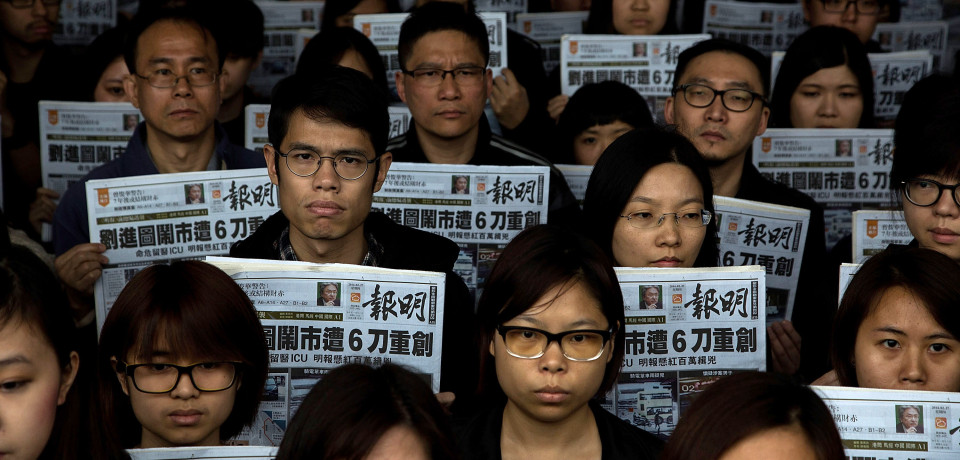While authorities have long viewed the media as a platform to voice the will of the Party, China’s media professionals have seen growing constraints since Xi Jinping came to power in 2012. State media editors have been fired and stripped of Party membership for questioning state policy, reporters detained after filing critical reports, and media organizations threatened with shutdown for not sufficiently upholding state censorship requirements. Last year, China was found to be the world’s largest jailer of journalists with 49 behind bars, an increase from the year prior.
At The Guardian, Tom Phillips reports that the steadily tightening media landscape is dissuading many young reporters from continuing a career in journalism:
[…] “Being a journalist has no meaning any more,” said a thirtysomething editor from one of China’s leading news organisations. “My greatest feeling is that in recent years the industry’s freedoms have reached their lowest ebb in history.”
Before the Xi Jinping era, editors at least had the autonomy to choose their own headlines, the journalist complained. Now newspapers and websites were forced to conform to a tedious monotony of praise for China’s Communist leaders. “The top headline must [always] be about Xi Jinping and the second must be about [prime minister] Li Keqiang,” the editor said. “If you read one website, you have read them all.”
[China Media Project’s David] Bandurski, the author of a book on investigative reporting in China, said the Xi administration’s growing intolerance of critical reporting was becoming clearer by the month.
[…] After more than a decade in the business, the editor, who declined to be named for fear of reprisals, said he was also on the verge of resigning. “Freedom is very important – it is the most important thing – but we don’t have it in China, especially in journalism,” he said.
“You can’t write what you want. You can’t interview who you want. And even if you do, you can’t publish it. Working in the Chinese media feels like you are wasting your life.” [Source]
The International Federation of Journalists, who recently released a report documenting the impediments to media freedom in China, also distributes a monthly bulletin on the challenges facing journalists in China.
Some assessments are somewhat brighter. In a deleted essay translated by CDT, Caixin deputy editor-in-chief Gao Yu (not Gao Yu) writes that while “news commentary in our society is already dead” and “daggers and spears are no longer tolerated,” he still has faith in the power of investigative journalism to expose “the unchecked dealings between those with power and those with money. […] It just takes solid, professional factual research, along with patient and objective narrative, and it bursts out of the shadows. When the truth is exposed, it’s irrefutable.”
Even as reporting on politically sensitive topics becomes increasingly risky, there are issues where reporters have gained ground for progressive coverage. Also at The Guardian, Anna Leach reports on praise that Rainbow Media Awards founder Xiaogang Wei offered China’s journalists for their increasing coverage of LGBT issues:
Wei says negative, stereotyping and disrespectful media coverage of LGBT people is less common than it was five years ago. “In 2012 we only had 365 reports on LGBTI issues in the media. But in 2015 we had 867 reports. It has increased a lot. And the reports are also more objective, more positive.” RMA is now working with UN development programme and academics to produce a more official report on the national media’s coverage of LGBT issues.
Since starting the awards, the group behind them have expanded what they do to offer media training for LGBT-rights organisations and LGBT-rights training for journalists. At the trainings all over the country, journalists tell Wei that it is still very difficult to get editors to cover LGBT issues, especially in China’s interior cities. “One journalist told me she tried to pitch the story for over a year and finally it was published,” says Wei. “But that really encouraged me that some journalists are making the effort, not just LGBTI organisations.”
Wei says that while coverage of LGBT issues is getting more positive and understanding, it still needs to be more diverse. “LGBT reports have seen a lot of improvement,” he says. “But there’s more to do. We might have gay or lesbian people in the media – but not transgender, intersex, bisexual or queer people. There are still a lot of things that need to be more reported on so there are more voices.” […] [Source]








